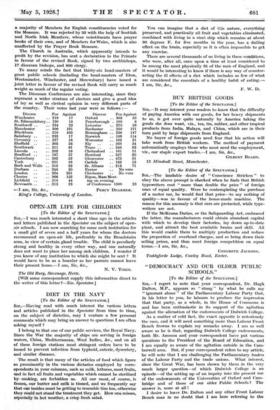DIET IN THE - NAVY [To the Editor of the
SPECTATOR.]
Sui,—Having read with much interest the various letters and articles published in the Spectator from time to time, on the subject of dietetics, may I venture a few personal comments which may bring an answer to questions I am often asking myself ?
I belong to that one of our public services, the Royal Navy. Since the War the majority of ships are serving in foreign waters, China, Mediterranean, West Indies, &c., and on all of these foreign stations most stringent orders have to be issued to prevent infection from typhoid, enteric, dysentery, and similar diseases.
The result is that- many of the articles of food which figure so prominently in- the various dietaries employed by corre- spondents in your columns, such as milk, lettuces, most fruits, and in fact all fruits and vegetables which cannot be sterilized by, cooking, are forbidden us. All our meat, of course, is froien, our butter and milk is tinned, and we frequently say that our insides must be getting to resemble tins too, otherwise they could not stand the treatment they get. How onc. misses, especially in hot weather, a crisp fresh salad.
You can imagine that a diet of le•Ms nature, everything preserved, and practically all fruit and vegetables eliminated, combined with living in a steel ship which remains •at about 90 degrees F. for five months in the year, has a dulling effect on the brain, especially as it is often impossible to get any exercise.
There are several thousands of us living in these conditions, who were, after all,- once upon a time at least considered to be among the most physically fit of the men of England, and it would be interesting to know if there is any way of counter- acting the ill effects of a diet which includes so few of what are considered the essentials of a healthy habit of eating.— I am, Sir, &c., F. W. D.








































 Previous page
Previous page